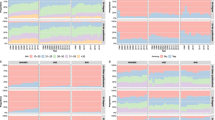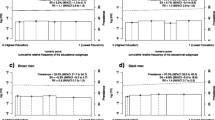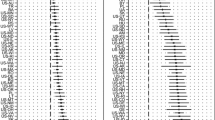Abstract
Objectives
This study aimed to compare the magnitude of educational inequalities in self-reported and examination-based hypertension and hypercholesterolemia and to assess the impact of self-reported measurement error on health inequality indicators.
Methods
We used the Portuguese National Health Examination Survey data (n = 4911). The slope index of inequality (SII) and the relative index of inequality (RII) were used to determine the magnitude of absolute and relative education-related inequalities.
Results
Among the 25–49-year-old (yo) men, absolute and relative inequalities were smaller for self-reported than for examination-based hypertension (SIIeb = 0.18 vs. SIIsr = − 0.001, p < 0.001; RIIeb = 1.99 vs. RIIsr = 0.86, p = 0.031). For women, the relative inequalities were similar despite differences in self-reported and examination-based hypertension prevalence. For hypercholesterolemia, self-reported relative inequalities were larger than examination-based inequalities among the 50–74-yo men (RIIsr = 2.28 vs. RIIeb = 1.21, p = 0.004) and women (RIIsr = 1.22 vs. RIIeb= 0.87, p = 0.045), while no differences were observed among 25–49-yo.
Conclusions
Self-reported data underestimated educational inequalities among 25–49-yo men and overestimated them in older individuals. Inequality indicators derived from self-report should be interpreted with caution, and examination-based values should be preferred, when available.


Similar content being viewed by others
References
Barros AJ, Hirakata VN (2003) Alternatives for logistic regression in cross-sectional studies: an empirical comparison of models that directly estimate the prevalence ratio. BMC Med Res Methodol 3:21. https://doi.org/10.1186/1471-2288-3-21
Burgard SA, Chen PV (2014) Challenges of health measurement in studies of health disparities. Soc Sci Med 106:143–150. https://doi.org/10.1016/j.socscimed.2014.01.045
Cameron KA, Song J, Manheim LM, Dunlop DD (2010) Gender disparities in health and healthcare use among older adults. J Women’s Health 19:1643–1650. https://doi.org/10.1089/jwh.2009.1701
Campos-Matos I, Russo G, Perelman J (2016) Connecting the dots on health inequalities: a systematic review on the social determinants of health in Portugal. Int J Equity Health 15:1–10. https://doi.org/10.1186/s12939-016-0314-z
Choi A, Cawley J (2018) Health disparities across education: the role of differential reporting error. Health Econ. https://doi.org/10.1002/hec.3609
Cutler DM, Lleras-Muney A (2010) Understanding differences in health behaviors by education. J Health Econ 29:1–28. https://doi.org/10.1016/j.jhealeco.2009.10.003.Understanding
de Mestral C, Stringhini S (2017) Socioeconomic status and cardiovascular disease: an update. Curr Cardiol Rep 19:115
Direção Geral da Saúde (2013) Abordagem Terapêutica das Dislipidemias no Adulto. Lisboa
Durack-Bown I, Giral P, d’Ivernois J-F et al (2003) Patients’ and physicians’ perceptions and experience of hypercholesterolaemia: a qualitative study. Br J Gen Pract 53(496):851–857
Eliassen B-M, Melhus M, Tell GS et al (2016) Validity of self-reported myocardial infarction and stroke in regions with Sami and Norwegian populations: the SAMINOR 1 survey and the CVDNOR project. BMJ Open 6:e012717. https://doi.org/10.1136/bmjopen-2016-012717
Ernstsen L, Strand BH, Nilsen SM et al (2012) Trends in absolute and relative educational inequalities in four modifiable ischaemic heart disease risk factors: repeated cross-sectional surveys from the Nord-Trøndelag Health Study (HUNT) 1984–2008. BMC Public Health 12:266. https://doi.org/10.1186/1471-2458-12-266
Fifth Joint Task Force of the European Society of Cardiology, European Association of Echocardiography, European Association of Percutaneous Cardiovascular Interventions et al (2012) European guidelines on cardiovascular disease prevention in clinical practice (version 2012). Eur J Prev Cardiol 19:585–667. https://doi.org/10.1177/2047487312450228
Gaio V, Antunes L, Namorado S et al (2017) Prevalence of overweight and obesity in Portugal: results from the First Portuguese Health Examination Survey (INSEF 2015). Obes Res Clin Pract 12:40–50
Jeffries M, Grogan S (2012) ‘Oh, I’m just, you know, a little bit weak because I’m going to the doctor’s’: young men’s talk of self-referral to primary healthcare services. Psychol Health 27:898–915. https://doi.org/10.1080/08870446.2011.631542
Kulhánová I, Hoffmann R, Eikemo TA et al (2014) Educational inequalities in mortality by cause of death: first national data for the Netherlands. Int J Public Health 59:687–696. https://doi.org/10.1007/s00038-014-0576-4
Kuulasmaa K, Tolonen H, Koponen P et al (2012) An overview of the European health examination survey pilot joint action. Arch Public Health 70:20. https://doi.org/10.1186/0778-7367-70-20
Lorant V, Boland B, Humblet P, Deliège D (2002) Equity in prevention and health care. J Epidemiol Community Health 56:510–516. https://doi.org/10.1136/jech.56.7.510
Mackenbach JP, Kunst AE (1997) Measuring the magnitude of socio-economic inequalities in health: an overview of available measures illustrated with two examples from Europe. Soc Sci Med 44:757–771. https://doi.org/10.1016/S0277-9536(96)00073-1
Mackenbach JP, Looman CWN, Van Der Meer JBW (1996) Differences in the misreporting of chronic conditions, by level of education: the effect on inequalities in prevalence rates. Am J Public Health 86:706–711. https://doi.org/10.2105/AJPH.86.5.706
Mindell JS, Giampaoli S, Goesswald A et al (2015) Sample selection, recruitment and participation rates in health examination surveys in Europe—experience from seven national surveys. BMC Med Res Methodol 15:78. https://doi.org/10.1186/s12874-015-0072-4
Molenaar EA, Van Ameijden EJC, Grobbee DE, Numans ME (2007) Comparison of routine care self-reported and biometrical data on hypertension and diabetes: results of the Utrecht Health Project. Eur J Public Health 17:199–205. https://doi.org/10.1093/eurpub/ckl113
Mosca I, Bhuachalla BN, Kenny RA (2013) Explaining significant differences in subjective and objective measures of cardiovascular health: evidence for the socioeconomic gradient in a population-based study. BMC Cardiovasc Disord 13:64. https://doi.org/10.1186/1471-2261-13-64
Newell SA, Girgis A, Sanson-Fisher RW, Savolainen NJ (1999) The accuracy of self-reported health behaviors and risk factors relating to cancer and cardiovascular disease in the general population. Am J Prev Med 17:211–229. https://doi.org/10.1016/S0749-3797(99)00069-0
Nunes B, Barreto M, Gil AP et al (2018) The first Portuguese National Health Examination Survey (2015): design, planning and implementation. J Public Health (Bangkok). https://doi.org/10.1093/pubmed/fdy150
Official Journal of the European Union (2014) Regulation (EU) No 282/2014 of the European Parliament and of the Council of 11 March 2014 on the establishment of a third programme for the Union’s action in the field of health (2014–2020). Off J Eur Union 13
Paalanen L, Koponen P, Laatikainen T, Tolonen H (2018) Public health monitoring of hypertension, diabetes and elevated cholesterol: comparison of different data sources. Eur J Public Health. https://doi.org/10.1093/eurpub/cky020
Perelman J, Fernandes A, Mateus C (2012) Gender disparities in health and healthcare: results from the Portuguese National Health Interview Survey. Cad Saude Publica 28:2339–2348. https://doi.org/10.1590/S0102-311X2012001400012
Preisendörfer P, Wolter F (2014) Who is telling the truth? A validation study on determinants of response behavior in surveys. Public Opin Q 78:126–146. https://doi.org/10.1093/poq/nft079
Reiner Z, Catapano AL, De Backer G et al (2011) ESC/EAS guidelines for the management of dyslipidaemias: the task force for the management of dyslipidaemias of the European Society of Cardiology (ESC) and the European Atherosclerosis Society (EAS). Eur Heart J 32:1769–1818. https://doi.org/10.1093/eurheartj/ehr158
Sommer I, Griebler U, Mahlknecht P et al (2015) Socioeconomic inequalities in non-communicable diseases and their risk factors: an overview of systematic reviews. BMC Public Health 15:1–12. https://doi.org/10.1186/s12889-015-2227-y
Speybroeck N, Harper S, De Savigny D, Victora C (2012) Inequalities of health indicators for policy makers: six hints. Int J Public Health 57:855–858. https://doi.org/10.1007/s00038-012-0386-5
StataCorp (2017) Stata Statistical Software: Release 15. StataCorp, College Station
Tolonen H, Koponen P, Aromaa A et al (2008) Recommendations for the health examination surveys in Europe. Julkaisija-Utgivare-Publisher, Helsinki
Tolonen H, Koponen P, Mindell J et al (2014a) European health examination survey-towards a sustainable monitoring system. Eur J Public Health 24:338–344
Tolonen H, Koponen P, Mindell JS et al (2014b) Under-estimation of obesity, hypertension and high cholesterol by self-reported data: comparison of self-reported information and objective measures from health examination surveys. Eur J Public Health 24:941–948. https://doi.org/10.1093/eurpub/cku074
United Nations Educational Scientific and Cultural Organization (2011) International standard classification of education. United Nations Educational Scientific and Cultural Organization, Paris
Vellakkal S, Millett C, Basu S et al (2015) Are estimates of socioeconomic inequalities in chronic disease artefactually narrowed by self-reported measures of prevalence in low-income and middle-income countries? Findings from the WHO-SAGE survey. J Epidemiol Community Health 69:218–225. https://doi.org/10.1136/jech-2014-204621
von dem Knesebeck O, Verde PE, Dragano N (2006) Education and health in 22 European countries. Soc Sci Med 63:1344–1351. https://doi.org/10.1016/j.socscimed.2006.03.043
Wilkins E, Wilson L, Wickramasinghe K et al (2017) European cardiovascular disease statistics 2017 edition, vol 34. European Heart Network, Brussels, p 192. ISBN 978-2-9537898-1-2
Zhang Y, Moran AE (2017) Trends in the prevalence, awareness, treatment, and control of hypertension among young adults in the United States, 1999 to 2014. Hypertension 70:736–742. https://doi.org/10.1161/HYPERTENSIONAHA.117.09801
Acknowledgements
The Portuguese National Health Examination Survey (INSEF) was developed as part of the pre-defined project of the Public Health Initiatives Program, “Improvement of epidemiological health information to support public health decision and management in Portugal. Towards reduced inequalities, improved health, and bilateral cooperation,” that benefits from a 1.500.000€ Grant from Iceland, Liechtenstein, and Norway through the EEA Grants and Portuguese Government. The authors are grateful to all professionals who were involved in the INSEF implementation and to all INSEF participants.
Author information
Authors and Affiliations
Corresponding author
Ethics declarations
Conflict of interest
The authors declare that they have no conflict of interest.
Additional information
Publisher’s Note
Springer Nature remains neutral with regard to jurisdictional claims in published maps and institutional affiliations.
Electronic supplementary material
Below is the link to the electronic supplementary material.
Rights and permissions
About this article
Cite this article
Kislaya, I., Perelman, J., Tolonen, H. et al. Do self-reported data accurately measure health inequalities in risk factors for cardiovascular disease?. Int J Public Health 64, 721–729 (2019). https://doi.org/10.1007/s00038-019-01232-1
Received:
Revised:
Accepted:
Published:
Issue Date:
DOI: https://doi.org/10.1007/s00038-019-01232-1




